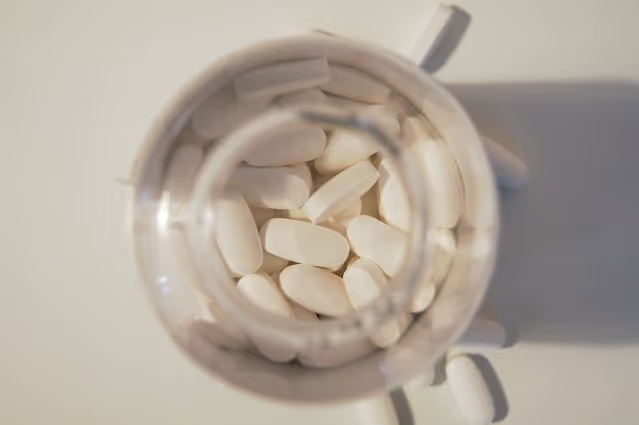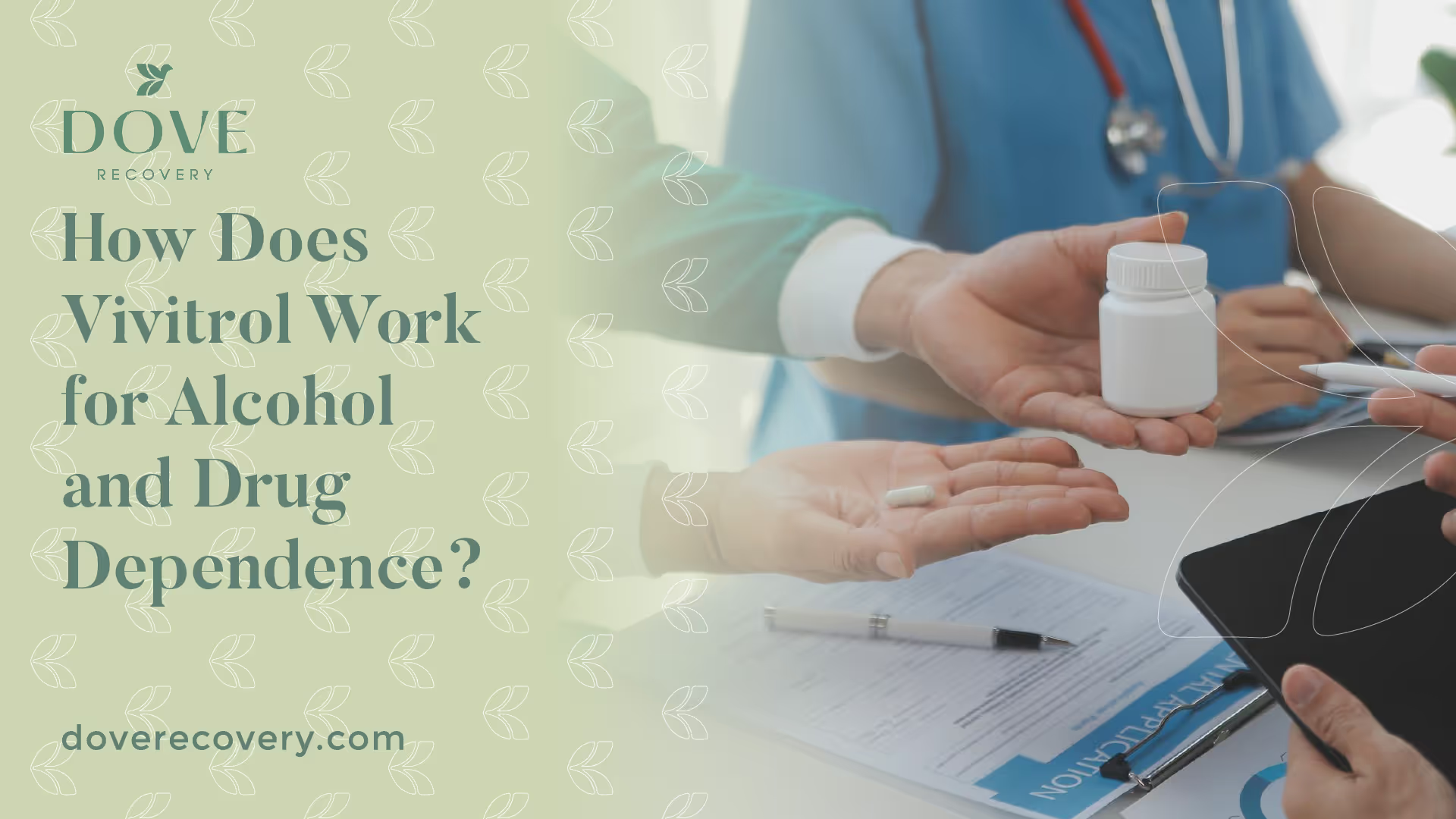How Does Vivitrol Work for Alcohol and Drug Dependence?

Understanding Vivitrol
Vivitrol is a medication used to treat alcohol and drug dependence. It works by targeting the underlying mechanisms of addiction and providing support for individuals on their journey to recovery. Let's explore the introduction to Vivitrol and learn how Vivitrol works for alcohol and drug dependence.

Introduction to Vivitrol
Vivitrol, also known by its generic name naltrexone, is an FDA-approved medication used in the treatment of alcohol and opioid dependence. It belongs to a class of medications called opioid antagonists, which means it blocks the effects of opioids in the body.
Unlike other forms of naltrexone that are taken orally, Vivitrol is administered as a monthly injection. This extended-release formulation ensures a steady and continuous release of the medication, providing long-lasting effects. The use of Vivitrol can help individuals reduce their alcohol consumption or manage their opioid dependence by decreasing cravings and preventing relapse.
How Vivitrol Works for Alcohol and Drug Dependence
The mechanism of action of Vivitrol involves several key processes that contribute to its effectiveness in the treatment of alcohol and drug dependence.
Blocking Opioid Receptors
Vivitrol works by blocking the opioid receptors in the brain. Opioid receptors are responsible for the pleasurable effects and reinforcing properties of opioids and alcohol. By blocking these receptors, Vivitrol prevents the euphoric effects of opioids and reduces the rewarding sensations associated with alcohol consumption. This can help individuals break the cycle of addiction and reduce their cravings for opioids or alcohol.
Reducing Alcohol Cravings
In addition to blocking opioid receptors, Vivitrol has been shown to reduce alcohol cravings. By modulating the brain's reward system, Vivitrol helps individuals resist the urge to drink alcohol. This can be particularly beneficial in the early stages of recovery when cravings are often intense and can lead to relapse.
Preventing Relapse
One of the significant benefits of Vivitrol is its ability to prevent relapse. By blocking the effects of opioids and reducing alcohol cravings, Vivitrol helps individuals maintain their sobriety. It provides a supportive treatment option that can be incorporated into a comprehensive recovery plan.
It's important to note that Vivitrol is just one aspect of a comprehensive treatment approach for alcohol and drug dependence. Therapy, counseling, and support systems play crucial roles in the recovery process.
Vivitrol offers individuals a way to address the physical aspects of addiction and support their journey to recovery. It is important to consult with a healthcare professional to determine if Vivitrol is the right treatment option for you.
Mechanism of Action
Vivitrol operates through a powerful mechanism of action to help individuals with alcohol and drug dependence. By understanding how Vivitrol works, we can gain insight into its effectiveness.
Blocking Opioid Receptors
One key aspect of Vivitrol's mechanism of action is its ability to block opioid receptors in the brain. Opioid receptors are responsible for the pleasurable effects that opioids produce, which can lead to addiction. By blocking these receptors, Vivitrol helps reduce the cravings for opioids and diminishes the rewarding sensations associated with their use. This makes it an effective treatment option for those struggling with opioid addiction.
Reducing Alcohol Cravings
In addition to its impact on opioid receptors, Vivitrol also helps to reduce alcohol cravings. By blocking the brain's reward system, it helps minimize the desire for alcohol, making it easier for individuals to abstain from drinking. This can be particularly beneficial for those seeking to overcome alcohol dependence.
Preventing Relapse
Vivitrol plays a crucial role in preventing relapse. By blocking the euphoric effects of opioids and reducing alcohol cravings, it helps individuals maintain their sobriety and avoid the cycle of addiction. This is achieved through long-lasting effects, as a single Vivitrol injection provides extended release of the medication over a period of one month. The sustained therapeutic action of Vivitrol helps individuals stay on track with their recovery journey.
Understanding the mechanism of action of Vivitrol provides insight into its ability to combat addiction. By blocking opioid receptors, reducing alcohol cravings, and preventing relapse, Vivitrol offers hope and support for individuals on their path to recovery. To further explore the benefits and considerations of Vivitrol, continue reading our article.
Naltrexone: The Active Ingredient
At the heart of Vivitrol's effectiveness lies its active ingredient, naltrexone. Understanding how naltrexone interacts with the body and its effects on the brain is crucial to comprehending the mechanism of action behind Vivitrol.
How Naltrexone Interacts with the Body
Naltrexone is an opioid receptor antagonist, meaning it blocks the effects of opioids in the body. When someone consumes opioids, whether through prescription pain medications or illicit drugs, these substances bind to opioid receptors in the brain, producing pleasurable and pain-relieving effects. However, naltrexone competitively binds to these receptors, preventing opioids from attaching and exerting their effects.
By blocking opioid receptors, naltrexone reduces the rewarding and reinforcing properties of opioids. This inhibition helps individuals break the cycle of addiction by diminishing the desire to use opioids and reducing the pleasurable sensations associated with their use.
Naltrexone's Effects on the Brain
In addition to its receptor-blocking properties, naltrexone also has effects on the brain that contribute to its efficacy. Naltrexone acts on the brain's reward system, which plays a significant role in addiction. By altering the reward pathways, naltrexone helps reduce the craving for opioids and lowers the risk of relapse.
Moreover, research suggests that naltrexone may modulate the release of certain neurotransmitters, such as dopamine, which are involved in pleasure, reward, and motivation. By regulating these neurotransmitters, naltrexone assists in restoring balance to the brain's chemistry, aiding in the recovery process.
It's important to note that naltrexone, as the active ingredient in Vivitrol, is not addictive itself and does not produce a euphoric effect when used as prescribed. Unlike opioids, it does not lead to physical dependence or tolerance. Instead, naltrexone acts as a tool to support individuals in their journey toward recovery from alcohol or opioid dependence.
Benefits of Vivitrol
Vivitrol offers several benefits that make it a valuable treatment option for individuals seeking recovery from alcohol and drug dependence. These benefits include long-lasting effects, non-addictive nature, and supportive treatment for recovery.
Long-Lasting Effects
One of the significant advantages of Vivitrol is its long-lasting effects. Administered as a monthly injection, Vivitrol provides continuous coverage and support, helping individuals stay on track with their recovery journey. By blocking the effects of opioids and reducing alcohol cravings, Vivitrol helps individuals maintain abstinence over an extended period.
The long-lasting effects of Vivitrol eliminate the need for daily medication or frequent dosing, making it a convenient and reliable treatment option. With proper medical supervision and support, individuals can focus on their recovery without the need for daily medication reminders.
Non-Addictive Nature
Another benefit of Vivitrol is its non-addictive nature. Unlike some other medications used in addiction treatment, Vivitrol does not lead to dependence or addiction itself. It works by blocking the effects of opioids and reducing alcohol cravings without producing any euphoric or addictive effects.
The non-addictive nature of Vivitrol gives individuals peace of mind, knowing that they are not substituting one addiction for another. It allows individuals to focus solely on their recovery and address the underlying causes of their alcohol or drug dependence.
Supportive Treatment for Recovery
Vivitrol serves as a supportive treatment for individuals in their recovery journey. Along with counseling and therapy, Vivitrol helps individuals maintain abstinence and reduce the risk of relapse. By blocking the opioid receptors and reducing alcohol cravings, Vivitrol provides individuals with the support they need to stay on track with their sobriety goals.
It's important to note that Vivitrol should be used as part of a comprehensive treatment plan that includes counseling, therapy, and behavioral interventions. The combination of Vivitrol and supportive treatment helps individuals address the physical, psychological, and emotional aspects of addiction, increasing the likelihood of long-term recovery.
By understanding the benefits of Vivitrol, individuals can make informed decisions about their treatment options.
Considerations and Precautions
Before considering the use of Vivitrol for alcohol and drug dependence, there are important considerations and precautions to keep in mind. These include medical supervision and monitoring, awareness of potential side effects, and understanding the individual response to Vivitrol.
Medical Supervision and Monitoring
When initiating treatment with Vivitrol, it is crucial to have medical supervision and monitoring throughout the process. A healthcare professional should be involved in determining the suitability of Vivitrol for an individual's specific needs and medical history. Regular check-ups and follow-up appointments allow for ongoing assessment of the treatment's effectiveness and any necessary adjustments.
Medical supervision is particularly important during the transition from opioid use to Vivitrol treatment. It ensures proper management of withdrawal symptoms and the initiation of Vivitrol at the appropriate time. In the case of alcohol dependence, medical supervision helps monitor the individual's progress and adjust the treatment plan accordingly.
Potential Side Effects
Like any medication, Vivitrol may have potential side effects. These side effects can vary from person to person and should be taken into consideration before starting treatment. It's important to have a thorough understanding of the possible side effects and discuss them with a healthcare professional.
Common side effects of Vivitrol include nausea, headache, dizziness, fatigue, and injection site reactions. These side effects are generally mild to moderate in severity and tend to subside over time. However, it's crucial to report any persistent or severe side effects to a healthcare professional.
Individual Response to Vivitrol
Each individual may have a different response to Vivitrol. While Vivitrol can be an effective treatment for many people, it may not be suitable for everyone. Some individuals may experience a reduced response to Vivitrol or may not respond to the medication at all. It is important to closely monitor the individual's progress and adjust the treatment plan accordingly.
In some cases, additional treatment modalities or interventions may be necessary alongside Vivitrol to support recovery. This individualized approach ensures that the treatment plan is tailored to the unique needs and circumstances of each person.
Remember, Vivitrol treatment should only be pursued under the guidance of a healthcare professional. They will be able to assess the individual's specific situation, address any concerns, and provide the necessary support throughout the treatment process.
Conclusion
In conclusion, Vivitrol is a valuable treatment option for individuals seeking recovery from alcohol and drug dependence. Its mechanism of action, which involves blocking opioid receptors and reducing alcohol cravings, helps individuals maintain abstinence and prevent relapse. As the active ingredient in Vivitrol, naltrexone offers non-addictive support to aid in the recovery process.
Vivitrol's long-lasting effects provide continuous coverage and support, eliminating the need for daily medication reminders. It serves as a supportive treatment option that can be incorporated into a comprehensive recovery plan alongside counseling, therapy, and behavioral interventions.
Before considering Vivitrol treatment, it is essential to keep in mind considerations such as medical supervision and monitoring, potential side effects, and individual response to the medication. By working closely with a healthcare professional throughout the treatment process, individuals can make informed decisions about their recovery journey.
Overall, Vivitrol provides hope and support for those seeking to break free from addiction. With its ability to address the physical aspects of addiction and reduce cravings for opioids and alcohol, it is a valuable tool in the fight against substance abuse disorders.
